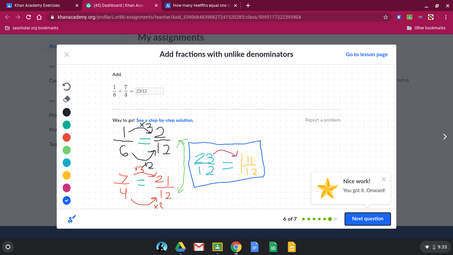2/12 = 1/6. Use the example problem and image to understand better why...

What else can I help you with?
What is one third plus one twelfths equal to?
five twelfths
Seven twelfths minus one sixth?
five twelfths 1/6 = 2/12 7/12 - 2/12 = 5/12
What is three and one sixth as a decimal?
Expressed as a decimal fraction, 3 and one sixth is equal to 3.16 recurring (that is, 3.16666..)
What is one third plus six twelfths?
Just get them all to a common base - 4 twelfths + 6 twelfths = 10 twelfths OR 5/6
What is one sixth as a whole number?
One sixth is not a whole number. Expressed as a decimal, it is equal to 0.16 recurring (that is, 0.16666..)
What does sixth twelfths equal?
one half
Is five sixth equivalent to ten twelfths?
Yes. Two twelfths equal one sixth, so it follows.
What is two twelfths equal to?
Two twelfths (2/12) is also known as one sixth (1/6). To make the number appear larger, another answer is three eighteenths.
Is one sixth equal to two twelfths?
Yes, one sixth is equal to two twelfths. This is because when you simplify two twelfths (2/12), it reduces to one sixth (1/6) by dividing both the numerator and the denominator by 2. Thus, 1/6 = 2/12.
Is two twelfths greater that two sixths?
Two twelfths is equal to one sixth, and is thus lesser than two sixths.
What is eight twelfth plus one sixth?
To add eight twelfths and one sixth, first convert one sixth to twelfths: one sixth equals two twelfths. Now, add eight twelfths and two twelfths together: (8/12 + 2/12 = 10/12). This can be simplified to five sixths. Thus, eight twelfths plus one sixth equals five sixths.
How many eighths is three twelfths equal to?
Three twelfths is equal to one fourth, which is equal to two eights.
How many twelfths in one sixth?
Oh, dude, you're hitting me with the tough math questions, huh? Well, technically, there are two twelfths in one sixth. It's like cutting a pizza slice into 12 pieces and then realizing you only want a tiny bit of it. Math can be a real buzzkill sometimes, right?
What is the equivalent of one sixth?
two twelfths
What is two twelfths reduce to?
One sixth.
What is two quarters minus two thirds?
Two quarters minus two thirds is negative one sixth. Two quarters is six twelfths, and two thirds is eight twelfths. Six twelfths minus eight twelfths is minus two twelfths or minus one sixth.
What is the lowest term of two twelfths?
one sixth
